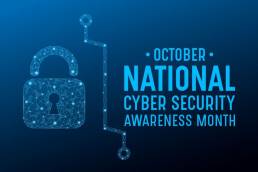Cybersecurity Awareness Month Protecting Yourself and Your Business

October is Cybersecurity Awareness Month
Every October, Cybersecurity Awareness Month reminds us of the importance of online safety, both at work and at home. This year, phishing is one of the biggest threats facing individuals and businesses. Phishing attacks use deceptive messages that trick people into revealing sensitive information, like passwords or financial details. In honor of Cybersecurity Awareness Month, let’s dive into what phishing is, how to recognize it, and how you can protect yourself and your business from falling victim to these increasingly sophisticated scams.
Types of Phishing Attacks to Watch Out For
Phishing attacks come in many different forms, each designed to look convincing and catch you off guard. Here are the types of phishing that everyone should know:
- Email Phishing: These are the most common. Cybercriminals send emails that appear to be from trusted sources, like banks or online services, asking you to “verify” or “update” information. Always double-check email addresses, as these can often be a giveaway.
- Smishing and Vishing: Phishing isn’t limited to your inbox! Smishing (SMS phishing) and vishing (voice phishing) use text messages and phone calls to try and steal your information.
- Spear Phishing: Unlike generic phishing emails, spear phishing targets specific individuals or organizations, often using details to make the email seem personal. Because it’s tailored, it can be harder to spot.
How to Recognize a Phishing Attempt
While phishing attempts can be sneaky, there are often red flags. Here’s what to look for:
- Suspicious Email Addresses: Scammers often use addresses that look official but contain small errors, like misspelled domains.
- Urgent Language: Phrases like “Immediate Action Required” or “Act Now” are designed to create panic, making you more likely to click without thinking.
- Links and Attachments: Be wary of links and attachments. Hover over links to see the full URL before clicking, and don’t open attachments unless you’re sure they’re safe.
Simple Steps to Protect Yourself from Phishing
Phishing protection starts with awareness, especially when everyone in your organization knows what to look for. Here are some essential steps to stay protected:
- Security Awareness Training: Regular training, such as the programs offered by KnowBe4, equips employees to recognize and respond to phishing attempts.
- Multi-Factor Authentication (MFA): Adding an extra step to logins, such as a one-time code sent to your phone, can make it much harder for hackers to access accounts even if they obtain your password.
- Email Security Tools: Advanced filters and anti-phishing software can detect and block phishing emails before they even reach your inbox.
How KnowBe4 Can Help
KnowBe4 specializes in security awareness training, which is key to protecting against phishing attacks. With interactive simulations and real-world scenarios, employees can gain the skills they need to recognize phishing attempts and react safely, helping businesses build a culture of cybersecurity awareness.
Stay One Step Ahead This Cybersecurity Awareness Month
Phishing is a constant and evolving threat, but Cybersecurity Awareness Month is the perfect time to take proactive steps to protect yourself and your business. By staying informed, setting up multi-factor authentication, and investing in employee training through tools like KnowBe4, you can outsmart scammers and protect your data. Remember, in cybersecurity, the best offense is a solid defense – so let this October be the start of safer online practices for your business and beyond.
